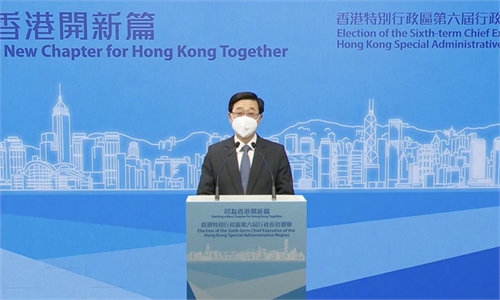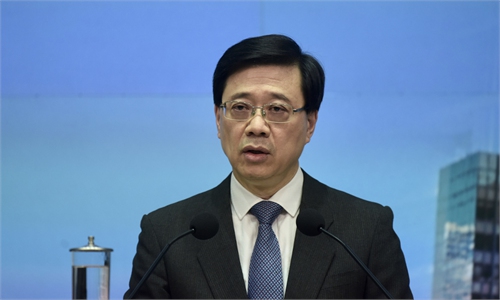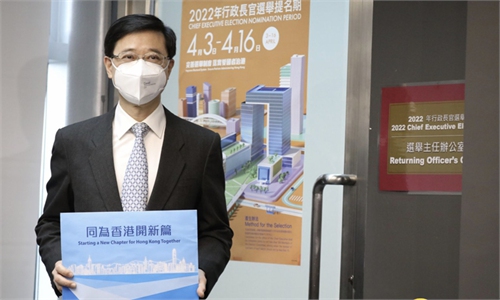John Lee delivers policy platform, highlighting governance efficiency, housing support, and HK youth future
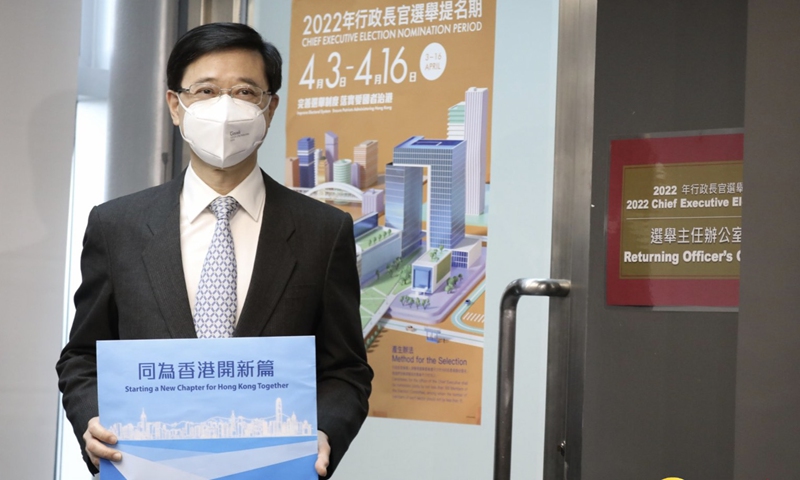
John Lee Ka-chiu formally submits his application for upcoming Chief Executive election in Hong Kong on Wednesday. Photo: Wen Wei Po
John Lee Ka-chiu, the candidate for the upcoming election for Chief Executive of Hong Kong Special Administrative Region government, unveiled his policy platform on Friday, focusing on strengthening local governance, fixing housing woes, enhancing the overall competitiveness of the city and building a caring society for young people.
A 44-page policy platform in both Chinese and English was issued on Friday, entitled "Starting a new chapter for Hong Kong together." As the city will face a more complex international environment and greater regional competition, Lee said that Hong Kong must strengthen its governance capability under the principle of only patriots administering Hong Kong. Lee proposed establishing a new mobilization protocol for the government by strengthening emergency response capability.
Also, he aims to enact local legislation to implement Article 23 of the Basic Law, and conduct thorough security risk assessments of different areas such as finance and health, and prepare contingency plans with bottom-line thinking, according to his policy platform.
Article 23 of the Basic Law stipulates that the Hong Kong government shall enact laws on its own to prohibit any act of treason, secession, sedition or subversion against the central government.
However, some 24 years after Hong Kong's return to the motherland, the legislation for Article 23 of the Basic Law has remained incomplete, making Hong Kong a weak link in national security and easy target for hostile foreign forces to disrupt public order and jeopardize social and economic interests.
Although the anti-government forces in Hong Kong have been dwindling, which are unlikely to pose severe challenges to Lee to deliver those policies, but the city still faces a severe internal and external environment that could lead to growing risks, Lau Siu-kai, vice-president of the Chinese Association of Hong Kong and Macao Studies who is also a senior government advisor, told the Global Times on Friday.
"Pressure from US-led West, global inflation and shrinking trade and the epidemic have been heavily weighing on the Hong Kong society. The future government may face many difficulties," he said.
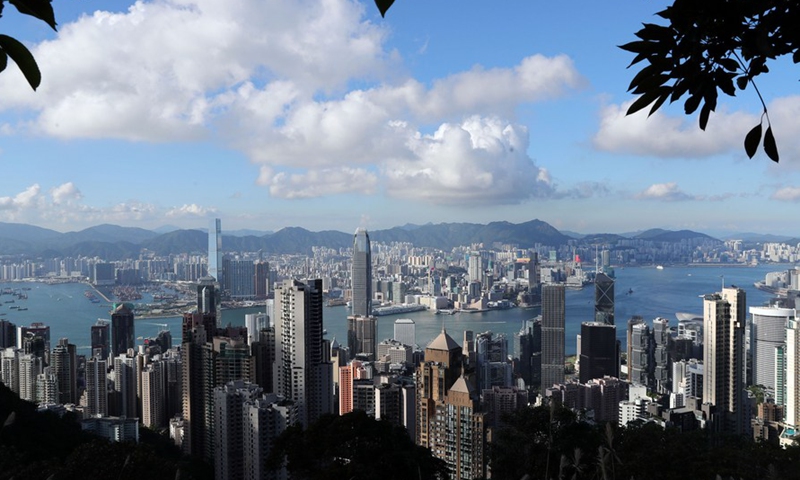
Photo shows a view by the Victoria Harbour in Hong Kong, south China, June 11, 2020.Photo:Xinhua
In order to enhance Hong Kong's international financial center status and promote its core strengths, Lee said the city must drive development through innovation, grow its real economy and seize the opportunities offered by the Greater Bay Area as part of aligning Hong Kong with the country's domestic and international dual circulation strategy and serving as a bridge that interconnects the mainland and the rest of the world.
To tackle deeply-seated issues related to housing -- a major concern of local residents, Lee said the new administration will expedite land and housing development and shorten the waiting time for public rental housing.
"The housing issues have been lingering on for over 20 years, we've seen many huge debates about that," Lee said at the delivery of the policy platform. He believed that he would lead a government with executive power to streamline procedures and to use innovative thinking in bringing the public housing plans onto the government's agenda.
He also said in his policy platform that the future government will adopt a result-oriented approach within the government by setting clear targets and key performance indications (KPIs) for selected tasks within the first 100 days of the new administration.
Putting the governance efficiency at the top priority is applaudable, Lau noted. "As Lee is the sole candidate, various sectors would consider his policy platform as his policy address and promises, which could be held accountable in the future," he said.
After years of exploration and debates, the central government and Hong Kong have reached a number of consensus on issues needed to be addressed including housing challenges, the future of Hong Kong's youth, innovation and competitiveness, wealth gap and education, to which Lee has basically respond in his policy platform, the expert noted.
Lee's policy platform also shed the light on the Northern Metropolis, which was first proposed by the incumbent Chief Executive Carrie Lam, in developing the northern Hong Kong into a metropolis covering about 300 square kilometres that border the southern Shenzhen, attracting innovation and business. Lee said in the policy platform that it should establish the Northern Metropolis as a nexus to build a high-quality GBA, to drive and sustain a diverse economy.
Another major part of his policy platform is to improve upward mobility for Hong Kong and enhance the education system. Since the social turmoil of 2019, the lack of national education among Hong Kong young students has been a major focus of the central and local governments, especially when a large number of young students went on streets and engaged in violence, sparking widely-shared concerns for their future.
It's necessary to nurture a new generation of young people equipped with global perspectives, professional skills, a mindset of lifelong learning and a sense of loving our country and Hong Kong, Lee said.
"Such proposal aroused my longing for the education sector to set things right as soon as possible, creating an education system that is compatible with 'one country, two systems,'" Wong Ching-yung, the principal of the Scientia Secondary School, told the Global Times on Friday.
The goal of our national education should be composed of knowing the country's history, political system and recognizing national identity and safeguarding the national security as well as contributing to the society, Wong said, noting that hopefully, Lee could help lead the education sector to carry out de-colonization campaign and bring the hearts of the young generation back to their motherland.

